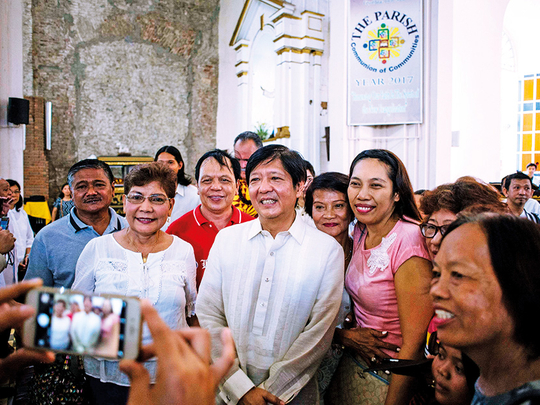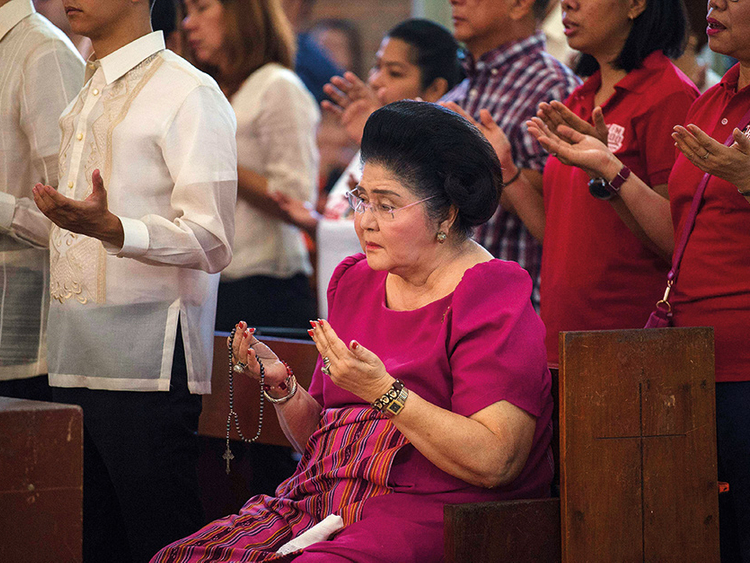
BATAC, Philippines: Philippine President Rodrigo Duterte hailed late dictator Ferdinand Marcos as a hero for many Filipinos during a weekend of emotional celebrations by supporters of the former strongman ahead of his 100th birth anniversary on Monday.
Duterte’s latest remarks are part of an escalating campaign to rehabilitate the image of Marcos and help the family’s remarkable political comeback — with the dictator’s widow a congresswoman and their son angling to become vice-president.
The outspoken Duterte, who has previously hailed Marcos as the country’s best-ever president, has declared the anniversary a holiday in Marcos’s home province of Ilocos Norte where they still wield political power.
“He was a president. To the Ilocanos, he was the greatest president. Why do we have to debate on that?” Duterte said late on Saturday.
“As far as the Ilocanos (are) concerned, Marcos is a hero,” he added, calling criticisms of the former leader “hogwash” and “garbage”.
Duterte, who has himself faced accusations of major human rights abuses, is a friend of the Marcos family and has played a key role in bolstering their efforts to regain the top echelons of political power.
Marcos, who was ousted in an army-backed popular revolt in 1986 and died in exile in Hawaii three years later, has been accused of embezzling billions of dollars from state coffers during his rule.
Anti-corruption watchdog Transparency International in 2004 named him the second most corrupt leader of all time, behind Indonesian dictator Suharto.
The dictator also oversaw widespread human rights abuses to maintain his grip on the country and enable his plundering, with thousands of people killed, tortured or imprisoned, rights advocates and previous Philippine governments said.
However no member of the Marcos clan has ever gone to prison and the family has made a stunning political comeback in recent years.
They have hosted various events in Ilocos in recent days showcasing the rule of their patriarch, including a Catholic mass and the unveiling of a plaque on Sunday at the family’s ancestral hometown of Batac.
Batac resident Lita Lampitoc, 72, summed up the adulation, saying: “We are Ilocanos so we are all for Marcos.”
Asked about the opposition to him, she said: “They do not know Marcos, we know Marcos. We don’t know anything about those angry at Marcos.”
At the unveiling of the plaque, Rene Escalante, head of a national historical commission, acknowledged differing views on Marcos’s leadership style but said his administration “had a great contribution on strengthening the nation”.
The marker mentioned how Marcos declared martial law in 1972, adding “he carried out programmes, projects and laws under the slogan ‘the New Society’”.
Ferdinand Marcos Juniorr, the dictator’s son, said the marker was a “final recognition of my father’s 21 years as president and 21 years of work as the primary nation-builder of our country”.
The Marcos son, who lost the vice-presidential election last year, has filed an election protest in hopes of overturning the result. Duterte, who was elected separately, has endorsed the protest.
The son was introduced at the event as “the soon to be vice-president of the Philippines”.
Imee Marcos, the dictator’s eldest daughter and governor of Ilocos, acknowledged the fierce opposition to her father.
She called for reconciliation, saying “let finally these two sides be brought together and the polarisation of our poor beleaguered nation be (ended)”.
However she made no mention of any apology or any concessions that might mollify anti-Marcos forces.
Duterte stunned the nation last November by allowing Marcos to be buried at the national “Heroes’ Cemetery” despite widespread protests that he was unfit for the honour.
He has also called for the abolition of an agency tasked with recovering Marcos’s ill-gotten wealth and suggested the family could return some of the wealth in exchange for immunity from prosecution.












